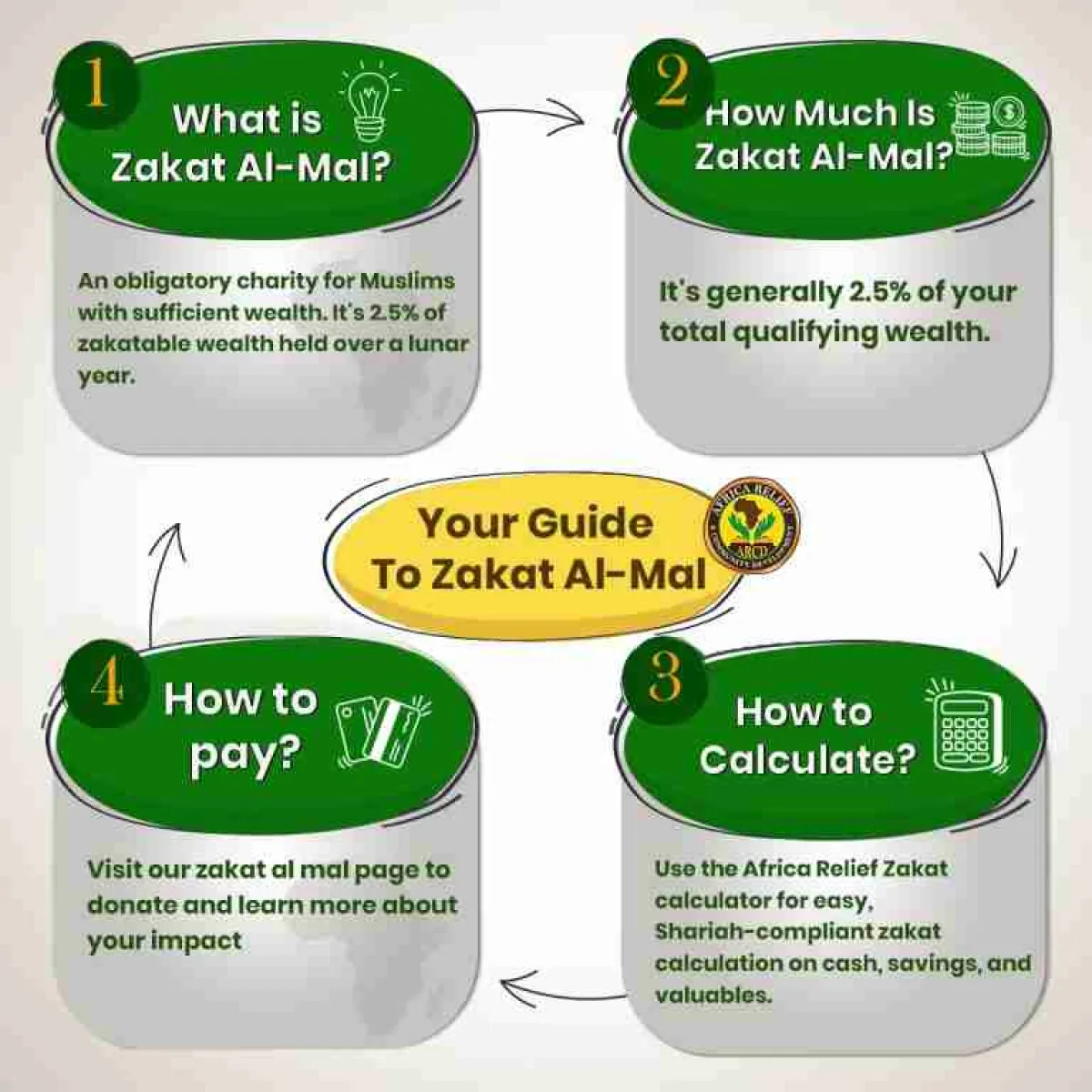Zakat al-Mal commonly referred to as “zakat on wealth”, one of Islam’s Five Pillars, is a form of almsgiving that not only purifies the giver’s wealth but also supports the needy and fosters community solidarity. Understanding what is Zakat al Mal, its calculation, rules, and how it benefits both the giver and receiver is essential for every Muslim. In partnership with Africa Relief, fulfilling your Zakat al-Mal becomes a direct path to aiding those in need across Africa. This guide will navigate you through the process, making it simple and rewarding
What is Zakat al mal?
Zakat al-Mal is the first type of zakat, it’s obligatory charity paid by Muslims who meet certain wealth criteria. It’s calculated as 2.5% of all zakatable wealth — money, gold, silver, and trade goods — that one has held for a lunar year. This act of giving is designed to cleanse your wealth and help reduce inequality by supporting those in need.
Pay your zakat online with Africa Relief at https://africa-relief.org/project-category/zakat/
How Much is Zakat al-Mal?
How much Zakat al-Mal is depends on your zakatable assets. It’s generally 2.5% of your total qualifying wealth. For example, if your total zakatable assets amount to $10,000, your Zakat al-Mal would be $250. This rate ensures that zakat is equitable, with those who have more contributing more to societal welfare.
How to Calculate Zakat al-Mal?
Using a Zakat al Mal calculator simplifies determining the amount you’re obligated to give. By inputting values like cash on hand, savings, and the value of gold or silver you own, the calculator automatically computes the zakat due. Africa Relief offers an easy-to-use calculator on our website, ensuring your calculation is accurate and Shariah-compliant.
Zakat al Mal Rules
Understanding the Zakat al Mal rules is crucial for proper compliance. Key rules include:
Nisab: The minimum amount of wealth one must have before zakat becomes due. It’s equivalent to the value of 85 grams of gold or 595 grams of silver.
Hawl: The lunar year that wealth must be held to qualify for zakat.
Eligible recipients: Zakat can only be given to specific categories defined in the Quran, including the poor, the needy, and those working to distribute zakat.
Deductible Debts
- Immediate Debts: Only immediate debts can be deducted from your zakatable wealth before calculating zakat.
- Long-term Debts: Generally, long-term debts do not affect the calculation unless payments are due within the year.

Zakat al-Mal vs Zakat al-Fitr
Zakat al-Mal is an annual obligation calculated on the wealth (such as cash, gold, silver, and trade goods) that a Muslim has held for over a lunar year. It is due from those whose wealth exceeds the nisab threshold, set at the value of 85 grams of gold or 595 grams of silver, and the zakat rate is 2.5% of the total qualifying wealth. This form of zakat aims to purify the wealth of Muslims, encouraging the redistribution of wealth within the community to assist those in need.
Zakat al-Fitr, on the other hand, is due at the end of Ramadan, before the Eid al-Fitr prayer. It is payable by every Muslim, young and old, and is calculated per person rather than on wealth. The amount is relatively small, often equated to the cost of one meal, and is intended to purify those who fast from any indecent act or speech and to help the poor and needy participate in the joy of Eid. Unlike Zakat al-Mal, Zakat al-Fitr is not dependent on nisab or the holding period of wealth.
Learn more about the difference between zakat al-mal and zakat al-fitr at the following link: https://africa-relief.org/zakat-al-mal-vs-zakat-al-fitr/
Donating your Zakat al-Mal through Africa Relief means directly supporting impactful projects across the African continent. From providing clean water and education to emergency relief and healthcare, your zakat transforms lives and communities.
Fulfilling your Zakat al-Mal is not just a religious obligation but an opportunity to make a significant impact. With Africa Relief, the process is transparent, efficient, and impactful, ensuring your contributions reach those who need them most. Visit our website to donate Zakat al Mal and learn more about how your zakat can help build a brighter future for communities across Africa. Together, we can uphold the beautiful tradition of zakat and witness its powerful effect on the world around us.
